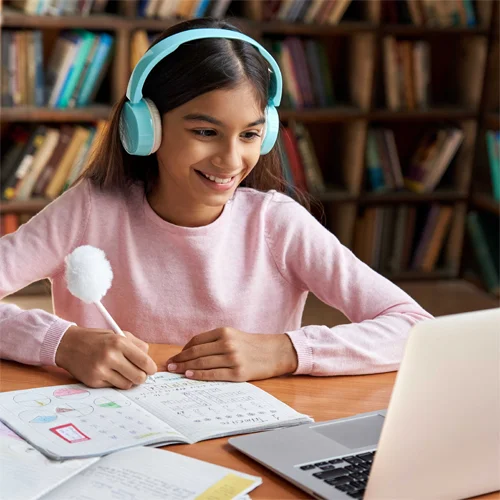By Chantale Alvaer, founder and teacher
As parents, we all ask ourselves this crucial question: how long will my child need one-on-one tutoring? As every child is unique, the answer is not so simple. But we’re here to guide you through this educational journey.
This is a common question among parents considering tutoring for their child. The reality is that there is no universal answer, because every child and every educational journey is different. However, we can offer some food for thought.
Identify the need for academic support
The duration of tutoring depends largely on the objective. Here are the four main types of individual tutoring:
Homework help: This tutoring helps students to understand and carry out their daily homework, clarifying questions and going into greater depth on complex subjects.
Subject enrichment: This type focuses on deepening knowledge beyond the curriculum, enriching the student’s understanding.
Revison: focused on exam preparation, this approach recapitulates and reinforces retention of key concepts.
Catch-up: Ideal for students experiencing difficulties, this tutoring aims to improve academic results to keep up with the pace of the class.
Frequency and duration of sessions
The frequency and duration of sessions vary according to the type of tutoring. Homework help is generally weekly and continues throughout the school year. Catch-up sessions end as soon as the student shows significant progress. For more general needs, more frequent sessions and longer-term support may be required. Revision is often brief, concentrated just before an exam, and ends after it.
What’s the average?
Every child has unique needs, but statistics can give a general idea. Since its inception, SOSteacher has tutored over 20,000 students, with an average of 16 tutoring sessions over six months.
Things to consider before you start
Before starting tutoring, assess your child’s specific needs and the goals to be achieved. This will help you determine the number of sessions required. Remember that every child is unique, and learning times may vary. We can give you a helping hand with this assessment from the very first session.
The impact of one-on-one tutoring: a concrete example
Take Clara, an energetic but initially shy third-grader who had particular difficulties in math. Her parents decided to opt for one-to-one math tutoring, twice a week, to boost her skills and confidence.
Clara’s tutor began by assessing her strengths and weaknesses to personalize her teaching approach. In just a few weeks, Clara began to show signs of improvement. Not only was she solving math problems with greater ease, but her participation in class also improved.
Her teachers noticed that she raised her hand more often to answer questions and was an active participant in class discussions. Even her classmates began to see her as a valuable resource during group work. Most impressive of all was how her confidence extended beyond mathematics!
Clara began to explore other areas with curiosity and enthusiasm, becoming a more well-rounded and confident student. This case illustrates perfectly how tutoring, by focusing on individual needs, can have a positive impact far beyond the subject being taught.
The importance of regular attendance at tutoring sessions
To guarantee effective tutoring, attendance is a key factor. Regular sessions help maintain continuity in learning and avoid the accumulation of backlogs. As studies show, tutoring is not just a question of duration, but also of frequency and regularity. Indeed, according to research conducted by the University of Toronto, tutoring programs that take place several times a week have shown significant improvements in students’ academic results.
Such regularity not only reinforces the knowledge acquired, but also develops a relationship of trust and understanding between tutor and student, which is essential for effective learning (read about the tutor’s role). Consistent commitment to tutoring sessions contributes to better assimilation of concepts, increased self-confidence and reduced stress in the face of school assessments.
Maximizing the impact of tutoring: Key strategies for effective learning
Personalized learning
Every student has unique needs and learning styles. It is therefore essential that tutoring sessions are customized to meet these specific needs. This involves an initial assessment of the student’s skills and constant adaptation of tutoring methods and content to ensure continuous progress.
Monitoring progress
To measure the effectiveness of tutoring, regular monitoring of the student’s progress is essential. This can be done through periodic assessments and constructive feedback. This feedback not only helps to adjust teaching strategies, but also motivates the student by showing him or her the progress made.
Involvement of parents
Parental involvement in the educational process is crucial. By staying informed and involved, parents can support the tutor’s work at home or online, encourage their child and reinforce the learning objectives set during tutoring sessions.
Developing study skills
Beyond academic content, tutoring should also focus on developing essential study skills. This includes the organization of study time, effective note-taking techniques and memorization strategies. These skills are fundamental to long-term academic success.
Building confidence
Tutoring plays an important role in building students’ self-confidence. By providing a supportive learning environment where students feel free to ask questions and explore ideas, tutoring can significantly improve student self-esteem and autonomy.
In conclusion, by adopting these strategies, one-on-one tutoring can become an enriching and transformative learning experience, leading to significant academic improvements and lasting personal development for the student. In the hope of answering the ever-popular question: How long will my child need tutoring?
Remember, every step, big or small, on the road to learning counts. We’re here to support your child every step of the way!













